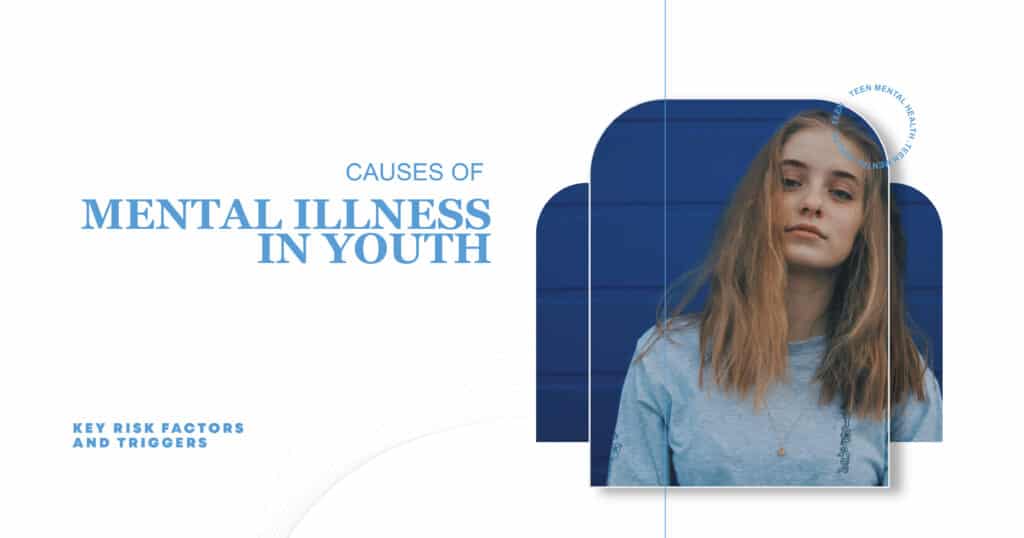When most people think about their teenage years, they probably picture friends laughing together, awkward school dances, and figuring out life step by step. Sounds pretty normal, right? But honestly, for a growing number of teenagers, it’s a lot heavier than that.
Mental health struggles like anxiety, depression, and other serious conditions are popping up way earlier, and way more often than they ever used to.
So what’s going on? Why are so many young people carrying so much weight? Let’s dive into the real causes of mental illness in youth. The ones we can see, the hidden ones, and the ones we might actually be able to do something about.
Understanding the Rise in Youth Mental Health Issues
Over time, there’s been a pretty shocking surge in cases of mental illnesses among youths. It’s one of the biggest problems this generation is grappling with. From depression, anxiety, to eating disorders, self-harm, and other intense emotional battles, the increase is obvious when you look back over the decades.
And here’s the thing, it’s not just a small uptick. It’s a full-blown spike. Study after study shows it. More teens today feel hopeless, overwhelmed, or stuck compared to teenagers from 20–30 years ago.
Emergency room visits for mental health crises have also skyrocketed. With teen suicide rates going up devastatingly. So no, it’s not “just a phase” or “kids being dramatic.” Something bigger’s happening. And figuring out why is the first step toward fixing it.
Why Are More Teens Struggling Than Ever Before?
So what’s causing this rise in mental health issues in youth? It’s a mix of a few things piling up all at once:
- Faster-paced world. Teens today deal with endless news, nonstop social media, and feeling like they’re always behind.
- Higher expectations. School, sports, and college plans are all starting way earlier.
- Less downtime. Not much breathing room; stress is basically baked into daily life.
- Global issues. Climate worries, political chaos, pandemics. All of this weighs on them.
Table: Quick Snapshot – Then vs. Now
| Area | Teens 20 Years Ago | Teens Today |
| Social life | In-person hangouts | Mostly online connections |
| Academic pressure | High, but localized | High with global competition |
| Access to info | Limited to books/TV | 24/7 internet and social media |
| Awareness of mental health | Low | Much higher (but stigma still lingers) |
Genetics and Family History: A Silent Influence
Sometimes, mental illness isn’t about what’s happening now. Usually, it’s been there, quietly, from the start. Genetics and family history are huge hidden factors behind youth mental health issues.
Our genes carry a lot more than hair color and eye color. They also pack the potential for medical conditions. Just like diabetes or heart disease, mental health disorders like depression, anxiety, bipolar disorder, and substance use can run in families.
Here are signs that family history could be a big factor:
- Multiple family members dealing with diagnosed mental illnesses
- Symptoms popping up early (before age 14)
- Big struggles with managing emotions, even as a young kid
It’s important to note that family history doesn’t mean it’s going to happen, no matter what. It just means if you know it’s a factor, you can be way more proactive. Regular emotional check-ins, creating a safe space for open conversations, and getting professional help early can tip the scales in a better direction.
The Impact of Childhood Trauma on Mental Health
You might not always see it, but childhood trauma is a massive contributor to the adolescent mental health crisis.
It’s not always huge, obvious events like major abuse (though that definitely counts). Trauma can also be:
- Ongoing bullying
- Parents who are emotionally unavailable
- Seeing violence at home or out in the world
- Losing someone important
- Growing up with constant instability (moving a lot, family upheaval)
When trauma doesn’t get addressed, it messes with how the brain processes stress. Imagine a teen who’s lost a parent. They might shut down emotionally, push people away, or turn to unhealthy coping habits like drinking or risky behavior.
Their brain basically gets wired to overreact to even small situations like a bad grade or a mean text, which can be exhausting.
| Type of Trauma | How It Might Show Up Later |
| Bullying | Social anxiety, depression, low self-esteem |
| Neglect | Struggles with trust, emotional numbness |
| Witnessing violence | PTSD symptoms, aggressive behavior |
| Loss of a loved one | Grief-driven depression, fear of abandonment |
Social Media, Screens, and the Adolescent Mind
Screens are everywhere in today’s world. That’s why it’s so hard to find a way around it. But the way teens use them makes a big impact on youth mental health.
Social media has two sides:
- Good side. Helps teens find their people, build communities, and get support.
- Bad side. Constant comparison, cyberbullying, FOMO (fear of missing out), ridiculous beauty standards.
Spending too much time online has been linked to rising cases of anxiety, depression, poor sleep, and body image issues among teens.
Signs that social media might be messing with a teen’s mental health:
- Always checking their phone, every few minutes
- Feeling “less than” compared to others online
- Crashing moods after scrolling
- Trouble falling asleep
- Losing interest in offline activities they used to love
School Pressure and Academic Expectations
Remember when getting a B was fine? Nowadays, it feels like teens have to be near-perfect, ace school, excel in sports, volunteer, and rack up honors, just to “stay competitive.”
That pressure’s brutal, and it’s one of the big pieces in the rise of mental health issues in youth.
Here’s what’s happening:
- Perfectionism. Feeling like anything under an A is a failure
- Test anxiety. Freaking out over exams
- Burnout. Total emotional and physical exhaustion halfway through the semester
- Losing joy. Hobbies and friendships are pushed aside for GPA-chasing
| Healthy Academic Drive | Unhealthy Academic Pressure |
| Setting personal goals | Feeling worthless over grades |
| Balanced life (school + hobbies + rest) | No time except for school |
| Growth mindset (“I’ll learn from mistakes”) | Terrified of making mistakes |
Spotting Early Warning Signs in Teen Mental Health
The truth is, mental illness often starts small. That’s why it’s so easy to brush off at first. Catching the signs early can make a world of difference.
Watch out for:
- Emotional changes. Feeling down, angry, or super irritable for long stretches
- Social withdrawal. Ditching activities and people they used to enjoy
- Academic struggles. Falling grades, missing assignments, losing focus
- Sleep/eating changes. Insomnia, sleeping all the time, changes in appetite
- Physical complaints. Headaches, stomachaches, mystery illnesses with no clear cause
- Low self-esteem. Harsh self-criticism, feeling like they’re “never good enough”
- Reckless behavior. Risky driving, substance use, dangerous thrill-seeking
Quick reminder:
Everyone has rough patches. That’s normal. But if these signs stick around or get worse, it’s probably time to reach out. There’s no shame in asking for support.
Need Help Navigating Teen Mental Health? Hillside Horizon for Teens Can Help
If you’re worried about your teen or if your gut is just telling you something’s off, Hillside Horizon for Teens is here to help.
Our team of experts understands what you are going through, and they can help you make sense of it all. We can help with teenage psychological disorders, trauma, and challenges.
At Hillside Horizon for Teens, we offer:
- Custom therapy plans tailored for each teen
- Family support sessions to help everyone communicate better
- Holistic programs that mix creativity, outdoor fun, and mindfulness
- A safe, no-judgment zone where teens can heal and grow
Contact Hillside Horizon for Teens today to learn more about what we can do together.
FAQs
What are the main causes of mental illness in youth?
Honestly, it’s not just one thing. It’s usually a mix of some things from childhood, genetics, and too much pressure from school. Then add how overwhelming everything feels these days, and it starts to pile up.
How does genetics influence youth mental health?
If mental illness runs in the family, a teen might feel it more than others. Doesn’t mean they’re definitely going to struggle, but it makes it more likely, especially when life starts getting tough.
Can childhood trauma cause mental illness?
Yes, losing someone, growing up in an unstable home, or getting bullied, it doesn’t always show right away, but it leaves a mark. The way teens deal with stress later can be shaped by all these.
What role does social media play in adolescent mental health?
It helps sometimes, no doubt. But too much of it? That’s where things get tricky. Comparison, pressure, and always feeling left out. All of this can wear a teen down.
What are the early warning signs of mental illness in teens?
Mood swings that last, not wanting to hang out anymore, weird sleep patterns, these can be signs. If they’re acting off for a while or engaging in risky activities, it might be more than “just a phase.”




